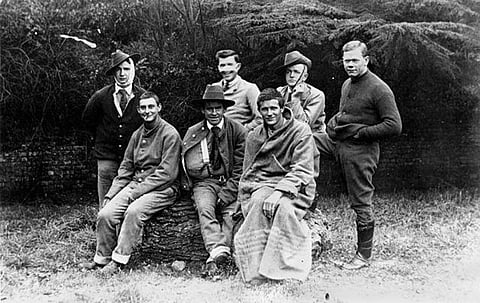
- Home
- न्यूजग्राम
- India
- World
- Politics
- Entertainment
- Culture
- Lifestyle
- Economy
- Sports
- Sp. Coverage
- Misc.
- NewsGram Exclusive
- Jobs / Internships

By- Khushi Bisht
Soldiers in the frontline during World War I often communicated via slang terms. They discussed languages and accents with their comrades, coining a host of slang terms in the process. As a result, the First World War spawned a slew of slang and vernacular terms. In this article, we will discuss the meanings of some of the most often used military slang terms during the First World War.
Follow NewsGram on LinkedIn to know what's happening around the world.
STRAFE
The word "strafe" is derived from the German expression 'Gott strafe England,' which meant 'God punish England,' and was commonly used during World War I. It had a plethora of definitions during the war, including an invasion, heavy bombing, and so on. "Harsh Punishment" or a "Strong bombard" were the main meanings of the term. The term "strafed" was used to describe a unit in combat that had suffered significant losses.
Effects of shell shock. Wikimedia Commons
SHELL SHOCK
From 1915, the word "shell shock" was used to describe the neurological state that troops experienced during the First World War. It was the name for a rare type of neural illness that afflicted the armed force during the war. According to a statement made in the House Of Lords in 1920, before "Shell Shock" was well recognized, executions for cowardliness and abandonment were imposed and executed on soldiers in the early stages of the war, who, in terms of subsequent events, were struggling from shell shock and therefore not accountable for their behavior.
IRON RATIONS:
"Iron Rations" was first used in the mid-1880s to refer to soldiers' emergency food supplies, especially for soldiers in combat. A can of tea and sugar, rice and bully beef, bread and biscuits, salt and chocolates were among the emergency supplies. However, during World War I, the word was coined to refer to shrapnel (fragments ejected from an explosion) or shellfire (the firing of large military guns).
Canned bully (corned) beef. Wikimedia Commons
DEKKO
The term "Dekko" derived from the Hindi word "Dekho" which means "to look." It is one of several terms that the British forces gathered during the British Raj, the time when India was ruled by the British. "Dekho" is one of a host of words carried from India by the British and eventually circulated in the British military. It became extremely popular during World War I.
COOTIES
Although the word "Cooties" may have had a previous prevalence, by 1917, it was commonly used in the armed and the newspapers. Following World War I, the word remained popular, primarily in the United States. It was used to refer to lice on the body or the head. According to the Oxford English Dictionary, it comes from the Malaysian word "Kuti" which means "Parasitic Insect."
Routing the "Cooties." Wikimedia Commons
BLIMP
The word "Blimp" was basically a slang word of an ambiguous origin and was coined to describe a tiny dirigible airship during the First World War. The British Military operated two kinds of airships during World War I, the first one was non-rigid airships, which were used for anti-submarine monitoring along the shore. The second one was stiff airships, which were primarily used by Germans. These were also used by the British Military, mostly to defend convoys. A more plausible explanation is that the term is intended to mimic the sound made by a highly inflated airship.
ALSO READ: Contribution of Radio In World War I And II
BLIGHTY
The term 'Blighty' comes from the Hindi word 'Bilayati,' which means 'foreign, particularly Europe.' The Hindi word "Bilayati" is itself derived from the Arabic word "Wilayati," which means "Provincial." This term was most likely coined by members of the British forces stationed in India in the late 1800s, but it acquired widespread usage during World War I. "Blighty wound," was military slang for a severe war injury that required the soldier to be evacuated, most likely to his home country.
An unidentified airship on the ground. Note the gunners on the front of the airship and on top of it. Wikimedia Commons
ARCHIE
This word was widely used during World War 1. It was a reference to German anti-aircraft artillery in particular. The only possible origin of the word is a classic music-hall song with the chorus "Archibald? Certainly Not!" According to popular belief, the term "Archie" and other anti-aircraft slang originated with a song sung by George Robey in 1911.
